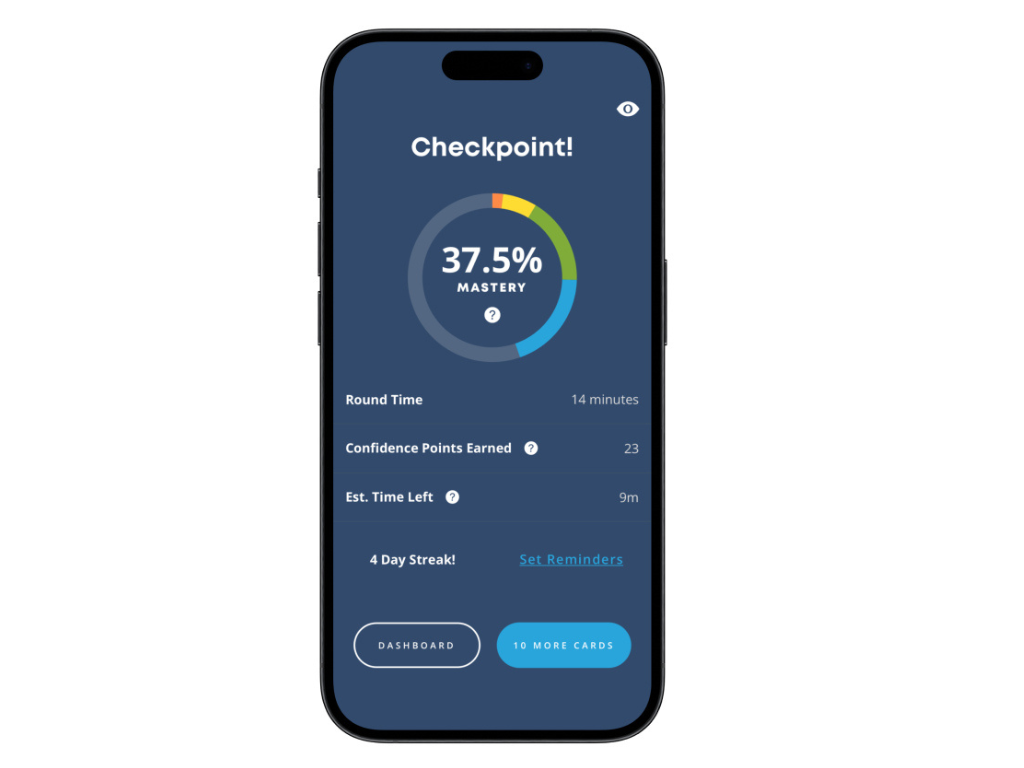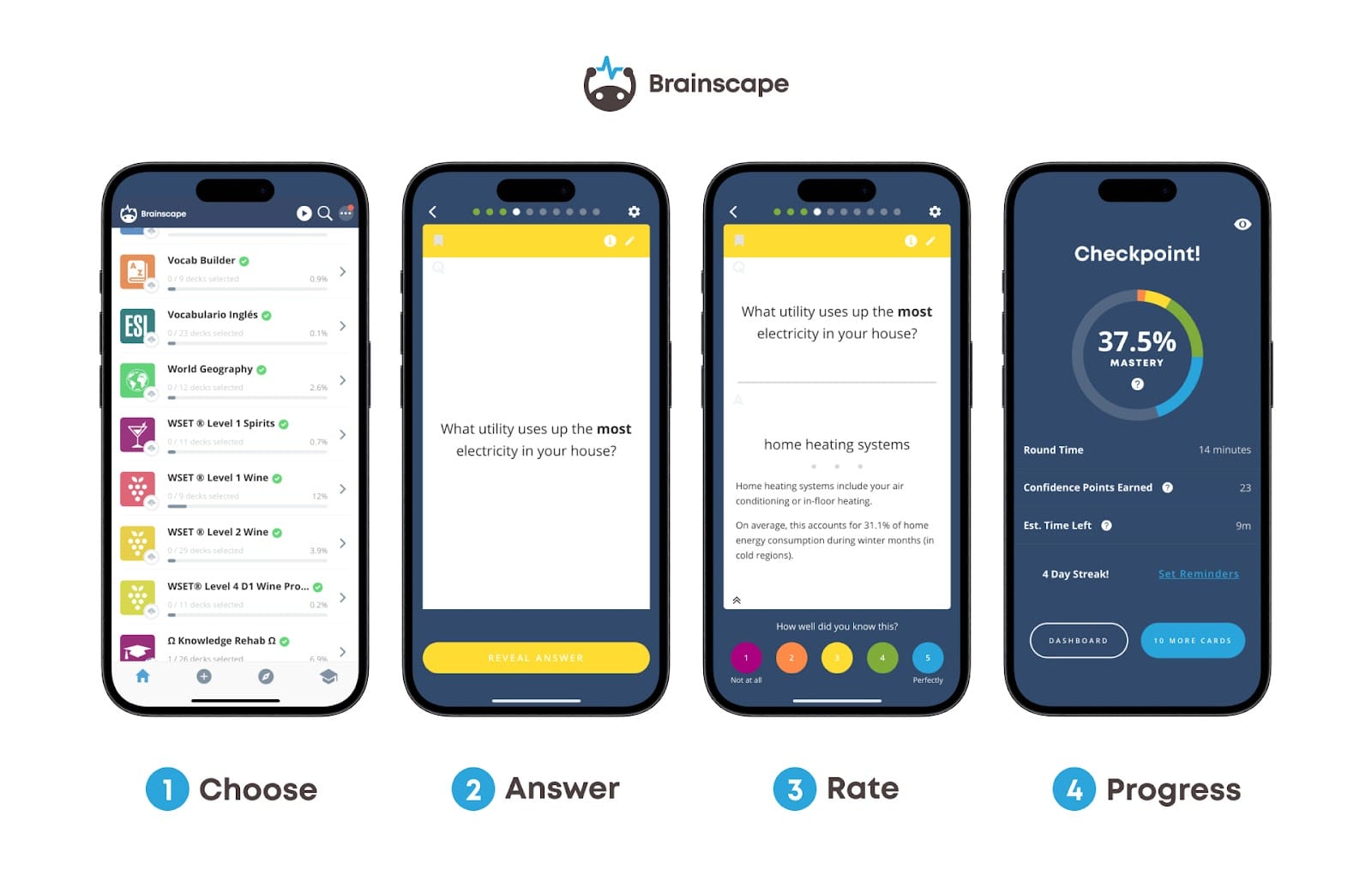Picture this: It’s the night before your big exam. You’ve got a mountain of material to study, a dwindling coffee supply, and an overwhelming sense of dread. Enter Brainscape flashcards, your knight in shining armor. Your digital savior. Your one last hope.
But let’s be real: can one app truly carry you to academic glory? Are flashcards effective on their own, or should they be used in conjunction with other study materials and modes? Let’s dive into what makes Brainscape among the best flashcard apps on the market and how to wield it like a study ninja.
TL;DR – Are Brainscape's flashcards all you need to improve your scores?
Oh, are you in a rush? That’s okay! Here’s the TL;DR of this article… but if you want more in-depth explanations, please keep reading!
- Brainscape flashcards are powerful. They harness your brain’s very own biology to help it learn much faster, employing spaced repetition and active recall to reinforce knowledge and prevent forgetting.
- Are Brainscape flashcards good? Yes, but they're intended to help you deeply internalize the knowledge you're exposed to in textbooks and lectures. In other words: they don't teach you the information from scratch; they help you retain it quickly and efficiently.
- How to use Brainscape effectively:
- Find or create flashcards for your subject/exam;
- Study alongside your primary study materials, using the flashcards to ingrain the facts as you progress; and
- Invest a little time every day studying and the spaced repetition algorithm will do the rest!
- Track progress and stay motivated. Brainscape's study metrics keep you engaged—the same way fitness watches motivate you to log another workout!—and make studying feel more rewarding.

Are Brainscape flashcards good for solo success?
Yes. And the app is backed up by cognitive science.
Its power lies in combining active recall and spaced repetition—two fancy terms that mean “stop passively staring at your notes” and “review stuff before you forget it.” Your brain tosses out 50% of what you learn in a day unless you actively reinforce it. Brainscape’s algorithm is like your personal study coach, showing you flashcards just before your brain decides to delete the info for more pressing matters.
But are they ALL you need?
In other words: can you learn, study, and pass a subject or exam with ONLY flashcards in your corner?
Well, it depends.
- For memorization-heavy topics like vocab drills, historical dates, or formulas, flashcards can be a one-stop shop. (Check out our comprehensive guide on studying math with flashcards.)
- For content-heavy subjects like biology, history, and languages, flashcards serve a fundamental purpose: they help you systematically ingrain and retain the facts you’re exposed to in the more detailed learning ecosystem of a classroom, textbook, or other learning materials. (i.e. They cut “the fluff” and help you bank the facts.)
- For skills that require deeper, more contextual understanding (think essays, proofs, or coding), flashcards should be part of a larger toolbox. They’re an important player, but the key to success here is hands-on skills practice.
How to use Brainscape effectively
Let’s be clear: just downloading Brainscape won’t magically boost your scores (we know, bummer). To truly crush your exams, you’ll need to use it wisely. Here’s how:
1. Pair flashcards with primary sources
Brainscape is the best flashcard app for drilling facts, but for context-heavy subjects like literature or biology, you’ll want to start with textbooks or lectures. Once you essentially understand the material, use Brainscape to lock it into memory.
2. Customize your decks
Use Brainscape’s AI flashcard generator or make flashcards yourself with our awesome flashcard authoring tools to create decks that cover exactly what you need to know. Studying for a very particular assessment? Cut out the concepts that aren’t on your test and focus on exactly what you need to learn.
Pro tip: Use our expert-curated flashcards that cover EVERY concept tested on major exams from high school AP through to law school, nursing, medicine, finance, real estate, sommelier certifications, and more!
3. Trust the algorithm
Brainscape’s spaced repetition system is scientifically designed to optimize your study sessions. Rate yourself honestly and the app will take all the thinking out of organizing your flashcards. The algorithm is designed to only show you concepts within your optimized learning zone, so you get the most out of your study sessions and DOUBLE your learning speed.
Check out this video for more tips on increasing your learning speed:
Are flashcards actually effective alone?
Here's the tea: flashcards alone can be effective, but only for certain types of learning. If you're memorizing lists, formulas, or terms, Brainscape's flashcards are like the Swiss Army knife of study tools.
For more complex subjects, think of flashcards as the bricks rather than the whole building. With a foundation of course notes, build your knowledge with flashcards, then test the structure with practice questions. Once you know how to use Brainscape effectively, it becomes a game changer for a comprehensive studying approach.
The final verdict: Brainscape flashcards are your MVP

So, are Brainscape flashcards all you need to improve your scores?
Almost. They’re a powerhouse tool for memorization and review, but you unlock their true power when you use them strategically. Combine them with other study methods, plan your study, and customize your decks to match your needs.
Brainscape is more than just the best flashcard app—it’s your ticket to smarter, faster learning. Download it now and get ready to crush your next exam.
—
We think you’ll love these related articles:
- Does Anki work (and is it worth the hype)?
- The secret to learning more while studying less: adaptive learning
- 10 Top productivity apps to organize your study and work life
Sources
- Ebbinghaus, H. (1913). Memory: A contribution to experimental psychology. New York: Teachers College, Columbia University.
- Karpicke, J. D. (2012). Retrieval-based learning: Active retrieval promotes meaningful learning. Current Directions in Psychological Science, 21(3), 157-163.
- McLeod, S. (2024) Vygotsky’s zone of proximal development, Simply Psychology - Vygotsky’s Zone Of Proximal Development. Available at: https://www.simplypsychology.org/zone-of-proximal-development.html
- Zald, David H., Isabelle Boileau, Wael El-Dearedy, Roger Gunn, Francis McGlone, Gabriel S. Dichter, and Alain Dagher. "Dopamine Transmission in the Human Striatum during Monetary Reward Tasks." The Journal of Neuroscience 24, no. 17 (April 28, 2004): 4105.
